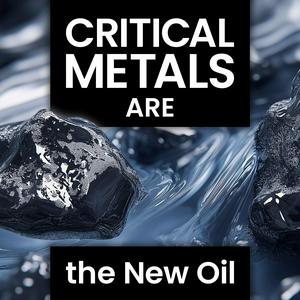The Implications of China’s Deep Sea Mining Strategy on US Defense Presence in Oceania
Episode DescriptionToday on the podcast, we welcome Lucia Fogler, a University of Virginia student researcher in public policy and global security. Lucia shares her research on how China is positioning itself as a leader in deep-sea mining—and what that means for U.S. national security.From mapping China’s ISA contract areas and tracking research vessel movements, Lucia highlights key trends in the Pacific that put pressure on the U.S. defense industrial base. She explains how seabed minerals could shift global supply chains, why Oceania is a critical theater for geopolitical competition, and what steps the U.S. might take to protect its strategic presence.If you’re interested in the intersection of critical minerals, defense, and geopolitics, this episode is a must-listen.GuestLucia Fogler, University of Virginia student researcher in public policy and global securityHostHolly NielsenEpisode DescriptionToday on the podcast, we welcome Lucia Fogler, a University of Virginia student researcher in public policy and global security. Lucia shares her research on how China is positioning itself as a leader in deep-sea mining—and what that means for U.S. national security.From mapping China’s ISA contract areas and tracking research vessel movements, Lucia highlights key trends in the Pacific that put pressure on the U.S. defense industrial base. She explains how seabed minerals could shift global supply chains, why Oceania is a critical theater for geopolitical competition, and what steps the U.S. might take to protect its strategic presence.If you’re interested in the intersection of critical minerals, defense, and geopolitics, this episode is a must-listen.Episode Timeline* Welcome, format, and handoff to Lucia (00:00:00)* Lucia’s background and research focus (00:00:29)* Agenda: background → positions on deep sea mining (DSM) → policy implications → recommendations (00:01:16)* Why DSM matters to U.S. defense: (1) critical minerals in DIB; (2) maintaining influence in Oceania (00:02:09)* DOD/NATO critical-minerals lists; China’s prominence across mining/refining/processing; all 16 found in the ocean (00:02:59–00:04:53)* Pacific context: island-chain theory; U.S. territories, EEZs, bases, and COFA agreements (00:05:11–00:09:03)* China’s Oceania footprint: security agreements (Solomon Islands, Kiribati, Vanuatu) and deep-sea collaborations (Cook Islands, Tonga, PNG) (00:09:10–00:11:12)* ISA contracts & dual-use concerns (Beijing Pioneer, COMRA, China MinMetals) (00:11:37–00:12:11)* U.S. vs. China posture on DSM; U.S. not an UNCLOS/ISA party; EO 14285 opens paths beyond national jurisdiction (00:12:22–00:14:24)* Method: open-source overlays of ISA polygons, U.S. sites, and vessel tracks (00:15:17–00:17:09)* Policy implications (3): countering U.S. influence; dual-use/civil-military fusion; market lock-out risk (00:17:51–00:18:58)* Case study—American Samoa & nearby PRC alignments (Tonga, Cook Islands) (00:19:34–00:20:22)* Proximity callout—Hawai‘i to CMC A5 ~600 miles; ISA sites near U.S. EEZ (00:21:03–00:21:23)* Undersea cables run through/near ISA areas; Xiangyang Hong 6 survey routes raise espionage/sabotage concerns (00:22:26–00:24:27)* What’s new: U.S. exploring EEZ permits; U.S.–Cook Islands MOU; renewed U.S. corporate interest (00:26:22–00:27:57)* Q&A highlights: provocation vs. economics (00:29:07–00:31:31); terminology (“mining” vs “harvesting”) (00:43:52–00:45:51); DSHMRA (1980) relevance (00:46:10–00:47:55); cultural/environmental concerns (00:52:10–00:55:59)Key Takeaways* Defense depends on seabed minerals: Critical minerals underpin U.S. defense tech; all 16 highlighted appear in ocean contexts (varying quantities).* China’s leverage spans sea and shore: Dominance across terrestrial supply chains is extending seaward via ISA contracts and Oceania partnerships.* Geography = strategy: PRC contract areas and partnerships frequently sit near U.S. assets or allies, challenging influence across the second/third island chains.* Dual-use risk is real: Research vessels and seabed work can coexist with ISR risks—especially where fiber-optic cables intersect ISA blocks.* U.S. legal posture is mixed: Non-participation in UNCLOS/ISA limits levers even as EO 14285 and legacy statutes (DSHMRA, 1980) create paths to act.* Race for processing & market share: If China leads DSM and processing, it could lock the U.S. out of critical-mineral markets vital to the Defense Industrial Base.* Momentum is shifting now: Fresh diplomacy (e.g., U.S.–Cook Islands) and renewed corporate interest suggest fast-moving competitive dynamics.Resources & Links* Lucia Fogler’s paper online * International Seabed Authority (ISA)* U.S. Geological Survey: Critical Minerals Review* Impossible Metals website This is a public episode. If you would like to discuss this with other subscribers or get access to bonus episodes, visit impossiblemetals.substack.com


